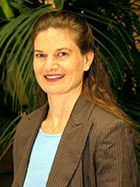Speaker Bios
 James M. Anderson, M.D., Ph.D.
James M. Anderson, M.D., Ph.D.
Director
Division of Program Coordination, Planning, and Strategic Initiatives
National Institutes of Health
National Institutes of Health Director Francis S. Collins, M.D., Ph.D., appointed Dr. Anderson Director of the NIH Division of Program Coordination, Planning, and Strategic Initiatives (DPCPSI) in September 2010.
“With experience in clinical medicine, in academic research, and in administration, Dr. Anderson has a broad understanding of the biomedical research spectrum that will serve him and the NIH well as he works with us to evaluate, prioritize, and coordinate a wide range of trans-NIH research opportunities. I am thrilled to have recruited him to NIH,” said Dr. Collins.
The NIH Division of Program Coordination, Planning, and Strategic Initiatives’ mission includes identifying emerging scientific opportunities, rising public health challenges, and scientific knowledge gaps that merit further research. The Division plans and implements trans-NIH initiatives supported by the Common Fund and coordinates research related to AIDS, behavioral and social sciences, women’s health, and disease prevention.
Before joining NIH, Dr. Anderson was Professor and Chair of the Department of Cell and Molecular Physiology in the School of Medicine at The University of North Carolina at Chapel Hill, a position he had held since 2002. Before his appointment at Chapel Hill, he was Professor of Medicine and Cell Biology and Chief, Section of Digestive Diseases, at the Yale School of Medicine. Dr. Anderson has extensive clinical experience in both internal medicine and hepatology, and he is considered among the top authorities in the world in his primary research field of tight junctions and paracellular transport. He has been a principal investigator on NIH grants for almost 20 years.
Dr. Anderson graduated from Yale and received his Ph.D. degree in biology from Harvard and his M.D. degree from Harvard Medical School.
 Niklas Blomberg, Ph.D.
Niklas Blomberg, Ph.D.
Founding Director
ELIXIR
Dr. Blomberg joined ELIXIR as the founding Director in 2013 following 14 years in the pharmaceutical industry with AstraZeneca, Sweden. He led the global cheminformatics unit from 2006 to 2011, and in 2011–2013 led the development of a new computational biology/computational chemistry unit for the AZ inflammatory research area.
He has been the Chairman of the Board for Bioinformatics Infrastructure for Life Sciences (BILS), Chair of the Advisory Board for the Swedish e-Science for Cancer Prevention and Control project (eCPC), and Advisory Board member for the Swedish e-Science Research Centre (SeRC) and the eTRIKS IMI project (European Translational Information and Knowledge Management Services Innovative Medicines Initiative). Dr. Blomberg was industry co‐chair for IMI Open PHACTS, a project with 24 industrial and academic partners to develop standards and infrastructure for effective data interoperability across chemistry and biology.
 Philip Bourne, Ph.D.
Philip Bourne, Ph.D.
Associate Director for Data Science
National Institutes of Health
Dr. Bourne is the Associate Director for Data Science (ADDS) at the National Institutes of Health. Formerly he was Associate Vice Chancellor for Innovation and Industry Alliances, a Professor in the Department of Pharmacology at the Skaggs School of Pharmacy and Pharmaceutical Sciences at the University of California, San Diego, Associate Director of the RCSB Protein Data Bank, and an Adjunct Professor at the Sanford Burnham Institute.
Dr. Bourne’s professional interests focus on service and research. He serves the national biomedical community through contributing ways to maximize the value (and hence accessibility) of scientific data. His research focuses on relevant biological and educational outcomes derived from computation and scholarly communication. This implies algorithms, text mining, machine learning, metalanguages, biological databases, and visualization applied to problems in systems pharmacology, evolution, cell signaling, apoptosis, immunology, and scientific dissemination. He has published over 300 papers and 5 books, one of which sold over 150,000 copies.
Dr. Bourne is committed to maximizing the societal benefit derived from university research. Previously he co-founded four companies: ViSoft Inc., Protein Vision Inc., a company distributing independent films free of charge, and, most recently, SciVee. He is also committed to furthering the free dissemination of science through new models of publishing and better integration and subsequent dissemination of data and results, which as far as possible should be freely available to all. He is the co-founder and founding Editor-in-Chief of the open access journal PLOS Computational Biology. Dr. Bourne is committed to professional development through the Ten Simple Rules series of articles and a variety of lectures and video presentations. He is a Past President of the International Society for Computational Biology, an elected fellow of the American Association for the Advancement of Science, the International Society for Computational Biology and the American Medical Informatics Association. His awards include the Jim Gray eScience Award (2010), Benjamin Franklin Award (2009), Flinders University Convocation Medal for Outstanding Achievement (2004), Sun Microsystems Convergence Award (2002), and CONNECT Award for new inventions (1996 and 1997).
 Michael Coburn
Michael Coburn
Chair, Health First
Executive Vice President
Research!America
Mr. Coburn is Executive Vice President and Chief Operating Office of Research!America, the Nation’s largest not-for-profit public education and advocacy alliance committed to making research to improve health a higher national priority. Throughout his more than 30 years serving the nonprofit sector, his focus on optimizing organizational performance through strong governance, sound management, and passionate advocacy has blazed a track record of success with prominent mission-based organizations.
Mr. Coburn previously served as Chief Operating Officer for The Arc of the United States, the Nation’s leading advocacy organization for people with intellectual and developmental disabilities. Holding primary responsibilities for membership, development, and communications, he developed new corporate partnerships and affinity programs that delivered value-added services to chapters while increasing revenue for the national office by 30 percent. From 1999 to 2004, he was President and CEO of the Tuberous Sclerosis Alliance. During his tenure, the organization achieved a 65 percent growth in private revenue, while at the same time launching a highly successful government relations program that resulted in a tenfold increase in Federal research funding for tuberous sclerosis complex. Under his leadership, the organization formed innovative scientific and clinical collaborations to accelerate scientific discovery and enhance patient care for individuals living with tuberous sclerosis complex. Prior executive experience includes management and leadership roles with a number of national nonprofit organizations.
 Tanja Davidsen, Ph.D.
Tanja Davidsen, Ph.D.
Project Manager
National Cancer Institute
National Institutes of Health
Dr. Davidsen is a bioinformatics specialist with a focus in cancer, infectious diseases, biological databases, cloud applications, and large-scale genomic data analysis.
Her accomplishments include gathering requirements from biologists and delivering intuitive informatics software solutions to the research community. She has designed and implemented high-performance bioinformatics Web solutions, working closely with software engineers to provide scientific feedback on tools based on the research community’s needs. Dr. Davidsen is committed to providing education on available bioinformatics resources to the research community through presentations at courses, workshops, and scientific conferences.
In her current role, Biomedical Informatics Specialist at NCI CBIIT, she is responsible for helping to manage several cancer-related Federal projects including data coordination for The Cancer Genome Atlas (TCGA) and Therapeutically Applicable Research to Generate Effective Treatments (TARGET) projects in the NCI Genomic Data Commons (GDC), a cancer genomics repository. She also helps oversee the NCI Cancer Genomics Clouds (GCG), pilot projects moving TCGA and other cancer genomics data into cloud resources for democratized data analysis.
Prior to her current role, Dr. Davidsen has served in a number of scientific and leadership roles including Bioinformatics Engineer Manager and Assistant Professor, Informatics Department at the J. Craig Venter Institute (JCVI), Rockville, Maryland, and Bioinformatics Engineer Supervisor at The Institute for Genomic Research (TIGR), Rockville, Maryland. Dr. Davidsen received her Ph.D. degree in microbiology and immunology from the Medical College of Virginia and her Bachelor of Science degree in biology and computer science from The College of William and Mary.
 Peter Goodhand
Peter Goodhand
Executive Director
Global Alliance for Genomics and Health
Mr. Goodhand is a leader in the global health sector as a senior executive and board member. In May 2016 he was appointed Interim President of the Ontario Institute for Cancer Research in addition to his role as the Executive Director of the Global Alliance for Genomics and Health (GA4GH). He played a key role in the creation of the GA4GH. Prior to this role, he was the President and CEO of the Canadian Cancer Society. Before joining the charitable sector, he had a 20-year career in the global medical technology industry, including strategic leadership roles with multinational health care companies such as American Cyanamid and Johnson & Johnson and as the founding Managing Director of the Health Technology Exchange (HTX).
Mr. Goodhand is currently Chair of the Board of HTX, Chair of the Steering Committee of the Occupational Cancer Research Center, Co-chair of the Medical and Scientific Advisory Board of Global Genes, board member of the AGE-WELL NCE, and a member of the Steering Committee of the Global Genomic Medicine Collaboration (G2MC). He served as board Chair and President of Canada’s Medical Device Industry association (MEDEC), chaired the Government of Canada’s Expert working group on the future of medical isotope production, and was a member of the Canadian delegation to the UN summit on non-communicable diseases.
Mr. Goodhand had a 12-year experience as a patient advocate, caregiver, and navigator throughout his family’s battle with a rare cancer.
 Michael Huerta, Ph.D.
Michael Huerta, Ph.D.
Associate Director
National Library of Medicine (NLM)
Director
NLM Office of Health Information Programs Development
National Institutes of Health
Dr. Huerta is Associate Director of the NLM and Director of the NLM’s Office of Health Information Programs Development. His office coordinates efforts to make the NLM’s considerable resources known to librarians, researchers, health care providers, and the general public; it oversees the Library’s international efforts as well as NLM’s evaluation and strategic planning activities. Since 1991, he has led several transformational efforts at NIH. These include promoting team and collaborative science through the NIH Roadmap’s Interdisciplinary Research Consortia, NIH Blueprint (http://neuroscienceblueprint.nih.gov/), and the NIH’s adoption and mainstreaming of multiple principal investigators on individual projects. He has also led many informatics and data-intensive research initiatives, starting with the Human Brain Project, which helped develop the field of neuroinformatics. More recently, he led the Human Connectome Project (http://www.humanconnectome.org/), which will provide comprehensive and systematic data about the connectivity of the human brain from some 1,200 healthy adults, and he directed the National Database for Autism Research (http://ndar.nih.gov/), which serves as a data repository and collaborative research platform for studies of autism. Today, Dr. Huerta is involved with a number of trans-NIH and trans-government efforts on standards, technologies, practices, and policies to more widely, efficiently, and meaningfully share biomedical research data. He is helping to lead the NIH Big Data to Knowledge (BD2K) initiative, which will support research and development in the area of data science and associated technologies (http://bd2k.nih.gov). Importantly, BD2K will also work to change policies and practices at NIH to raise the prominence of data in the biomedical research enterprise by increasing data sharing, supporting community-based standards efforts, and making data sets discoverable, citable, and linked to the scientific literature.
 Robert Kiley, M.Sc.
Robert Kiley, M.Sc.
Head of Digital Services
Wellcome Library
Wellcome Trust
Mr. Kiley is Head of Digital Services at the Wellcome Library. In this role he is responsible for developing and implementing a strategy to deliver electronic services to the Library’s users – both in person and remote.
Currently, he is taking a leading role in the implementation of the Trust’s open access policy and as such is responsible for liaising with publishers with regard to the Trust’s OA policy, and overseeing the development of the UK PubMed Central (http://ukpmc.ac.uk/) repository. He also acts as the Trust’s point of contact for eLife, the new top-tier, open-access research journal to be launched in 2012 with the support of the Howard Hughes Medical Institute, the Max Planck Society and the Wellcome Trust
Away from open access-related activities, Mr. Kiley is also responsible for developing the infrastructure to support the Wellcome Library’s strategy to provide free, online, universal access to the Library’s unique and important collections. Mr. Kiley has written a number of books including Medical Information on the Internet: A Guide for Health Professionals [Churchill Livingstone, 3rd edn. 2003], The Doctor’s Guide to the Internet [RSM, 2001], The Patient’s Internet Handbook [RSM 2002], and The Nurse’s Internet Handbook [RSM, 2005]. Mr. Kiley is a qualified librarian and an Associate Member of CILIP.
 Elizabeth Kittrie
Elizabeth Kittrie
Senior Advisor for Open Innovation and Policy
Office of the Associate Director for Data Science (ADDS)
National Institutes of Health
Ms. Kittrie brings two decades of experience in identifying, evaluating, and implementing health policy innovations. At the ADDS Office, she is focused on building new collaborations and initiatives to encourage open innovation through activities that encourage the co-creation of innovative solutions. In this role, she serves as the ADDS liaison to international, Federal, State, and local partners.
Prior to joining ADDS, Ms. Kittrie served as Senior Advisor to the Chief Technology Officer of the U.S. Department of Health and Human Services (HHS), where she led data access and open innovation activities across the Department. In that role, she served as Chair of the HHS Public Access Working Group and as Co-Founder of the HHS Innovation Council. She also led the Department’s policy development activities, promoting and facilitating the use of challenge and prize competitions at HHS. Prior to joining the Office of the Secretary, Ms. Kittrie served in a number of other senior roles at HHS, including in the U.S. Food and Drug Administration, Office of the Assistant Secretary for Planning and Evaluation, and Office of the Inspector General. Over her career, she has received several Federal-wide and Departmental awards for excellence. She also served as the first Associate Director for the Department of Biomedical Informatics and as the Associate Director for Strategic Initiatives at the Biodesign Institute at Arizona State University. Ms. Kittrie holds a master’s degree in management from the Heller School at Brandeis University and a B.A. degree from the University of Michigan at Ann Arbor.
 Jerry Sheehan
Jerry Sheehan
Assistant Director for Scientific Data and Information
White House Office of Science and Technology Policy
Mr. Sheehan is Assistant Director for Scientific Data and Information at the White House Office of Science and Technology Policy (OSTP), where he leads Administration efforts to increase access to the results of federally funded scientific research, including scholarly publications and scientific data. Mr. Sheehan joined OSTP from the National Library of Medicine, where he serves as Assistant Director for Policy Development. He has been involved in the design and implementation of policies to foster access to clinical, genomic, and other biomedical data and information. He previously worked at the Organisation for Economic Cooperation and Development, U.S. National Academies, and Congressional Office of Technology Assessment on innovation and Internet policy. He holds B.S. and M.S. degrees in electrical engineering and technology and policy from the Massachusetts Institute of Technology.

